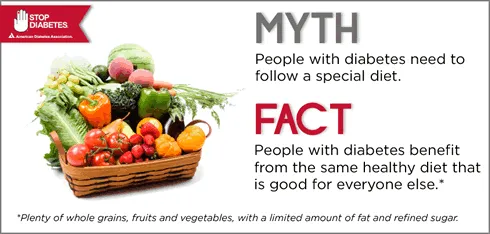There are beliefs about diabetes that make people accept some hard events such as diabetes is a serious and potentially deadly disease.These myths can create an image of diabetes that is not exact and that is full of stereotypes and stigmatization.
The World Health Organization (WHO) estimates that, worldwide, there will be more than 300 million diabetics in 2025 and the data indicate that between 20% and 25% of the adult population could suffer prediabetes.From the website of the American Diabetes Association, the most common myths and false beliefs are presented between the population and the real information that helps disassemble them:
1. Diabetes is not a serious disease
If diabetes is controlled properly, complications can be prevented or delayed.However, diabetes causes more deaths in a year than breast cancer and AIDS together.Two out of three people with diabetes die of heart disease or stroke.
2.If you have overweight or suffering, you will develop with time type 2 diabetes
Being overweight is a risk factor to develop the disease, but other risk factors such as family history, ethnicity and age are also involved.Unfortunately, too many people ignore the other risk factors for diabetes and think that weight is the only risk factor of type 2 diabetes. Most overweight people never develop type 2 diabetes and many people with type 2 diabetes haveA normal weight and a moderate overweight.
3. Eating too much sugar produces diabetes
The answer is not simple.Type 1 diabetes is caused by genetics and unknown factors that trigger the beginning of the disease, type 2 diabetes is caused by genetics and lifestyle factors.Having overweight increases your risk of developing type 2 diabetes and a high calorie diet from any source contributes to weight gain.The research has shown that drinking sugary drinks is linked to type 2 diabetes.
The American Diabetes Association recommends that people avoid the consumption of drinks sweetened with sugar to help prevent diabetes.These drinks include soft drinks, fruit juices, fruit drinks, energy drinks, sports, sweet tea and other sugary drinks.These drinks could raise blood glucose and provide several hundred calories in a single ration.
4.People with diabetes should eat special food for diabetics
A healthy eating plan for people with diabetes is usually similar to a healthy diet for any person, low in saturated and trans fats, moderate in salt and sugar, with food -based foods based on lean protein, vegetables without starch, whole grains, whole cereals,healthy fats and fruit.'Dietary' and diabetic foods usually do not usually offer special benefits.Most of them also raise blood glucose levels, they are usually more expensive and also have a laxative effect if they contain alcoholic sugars such as sweeteners.
5.If you have diabetes, you should eat only small amounts of food with starch, such as bread, potatoes and pasta
Starch foods can be part of a healthy eating plan, but the size of the portions is key.The integral forms of bread, cereals, pass and rice and vegetables with starch such as potatoes, sweet potatoes, chickpeas and corn can be included in meals and snacks.In addition, of these meals with starch, fruits, beans, milk, yogurt and sweets are also sources of carbohydrates, which must be reduced in the diet.
A good start is to include between 45 and 60 gramsof carbohydrates for food.However, you will need more or less carbohydrates at meals according to how diabetes is controlled.The most appropriate amount in each case is recommended with the doctor and clinical care team.Once the most appropriate individual amounts are known, each meal can be adapted according to these criteria.
6.People with diabetes cannot eat sweets or chocolate
People with diabetes can take sweets and desserts if they are eaten as part of a healthy eating plan or combined with exercise.There are no more 'prohibitions' for people with diabetes that exist for those who do not suffer from the disease.The key in sweets is to take a very small ration and reserve them for special occasions while food is focused on healthier foods.
7.You can 'catch' the diabetes of another person
No. Although we do not know exactly why some people develop diabetes, we know that it is not contagious and that you cannot catch like a cold or flu.There seems to be some genetic link in diabetes, particularly in type 2 diabetes. Lifestyle factors also intervene.
8.People with diabetes are more likely to cold or sick
There is no greater propensity to take a cold or other diseases.However, it is advisable that people with diabetes are vaccinated from the flu.This is because any disease can make it more difficult to control diabetes and people with diabetes that are infected with flu are more likely to develop serious complications.
9.If you have type 2 diabetes and your doctor says you need to start using insulin, this means that you have not managed diabetes well
For most people, type 2 diabetes is a progressive disease.When diagnosed, many people with type 2 diabetes can control their blood glucose levels at a healthy level with oral medications.But over time, the body gradually produces less insulin and finally oral medications are not enough to maintain normal glucose levels.Using insulin to get healthy glucose levels is something positive not negative.
10.Fruit is a healthy food, it's okay to eat as much as desired
Fruit is a healthy food.It contains fiber and many vitamins and minerals.Since the fruit contains carbohydrates, they need to be included in the feeding plan.The best thing is to talk to a dietitian about the quantity, frequency and types of fruits that should be eaten.


